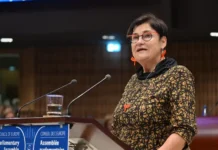A survey conducted by the Konda polling company and the Youth Organizations Forum (GoFor) has revealed that the majority of young people in Turkey between the ages of 18 and 30 think the imprisonment of prominent political prisoners is “fair,” Turkish Minute reported.
Titled “Youth Political Preferences Survey 2024” and released on Thursday, the survey is based on a representative sample of 1,864 people aged 18 to 30 across Turkey who were questioned by pollsters between February 7 and 18.
According to the survey, 54 percent of Turkey’s younger generations said they find the imprisonment of Kurdish leader Selahattin Demirtaş to be “fair,” while only 26 percent said the opposite.
Demirtaş, a two-time presidential candidate and former co-chair of the pro-Kurdish Peoples’ Democratic Party (HDP), has been behind bars since 2016 on politically motivated charges.
When asked about the imprisonment of businessman Osman Kavala, 35 percent of respondents said it was “fair,” and 28 percent said the opposite, while 37 percent had no opinion.
Kavala, 66, faced charges that have ranged from espionage and financing protests in 2013 to taking part in a failed coup against President Recep Tayyip Erdoğan in 2016. He was arrested in October 2017 and sentenced to life in 2022 for allegedly trying to topple Erdoğan’s government.
The participants were also asked to comment on the revocation of the parliamentary status of Can Atalay, who represents Hatay province from the Workers Party of Turkey (TİP), in late January, following a Supreme Court of Appeals decision that upheld an 18-year prison sentence in the Gezi Park trial.
While 52 percent said they didn’t have any idea or information regarding the issue, 35 percent said they find it to be “unlawful” and 12 percent said they “support” the revocation of Atalay’s status as an MP.
The Gezi Park trial defendants were convicted of attempting to overthrow the Turkish government for their alleged role in protests that began over an urban development plan in central İstanbul and spread to other cities in Turkey.
The youth-driven demonstrations morphed into a nationwide protest against perceived corruption by the ruling Justice and Development Party (AKP) and the growing authoritarianism of then-prime minister and current president Erdoğan.
Erdoğan’s government violently dispersed the protests and then began to crack down on its leaders.
To another question asking who they would vote for if a local election were held that day, 27.2 percent said they would support the main opposition Republican People’s Party (CHP), followed by those who said they would vote for the ruling AKP (13 percent), the far-right, anti-refugee Victory Party (ZP) (4.1 percent) and the pro-Kurdish Peoples’ Equality and Democracy Party (DEM Party) (3.4 percent).
While 44 percent of the young people defined themselves as “Atatürkist,” 39 percent saw themselves as “nationalist” and 12 percent as “conservative.”
Atatürkism, also known as Kemalism, is the founding and official ideology of the Republic of Turkey based on the ideas and legacy of Mustafa Kemal Atatürk, the architect of modern Turkey.
Sixty-six percent of the respondents pointed to “financial problems” as their most pressing issue, with 63 percent citing them as the primary reason for the increase in suicides among young people in Turkey.
Over the past several years the country has been suffering from a deteriorating economy, with high inflation and unemployment, as well as a poor human rights record. President Erdoğan is criticized for mishandling the economy, emptying the state’s coffers and establishing one-man rule in the country where dissent is suppressed and opponents are jailed on politically motivated charges.















